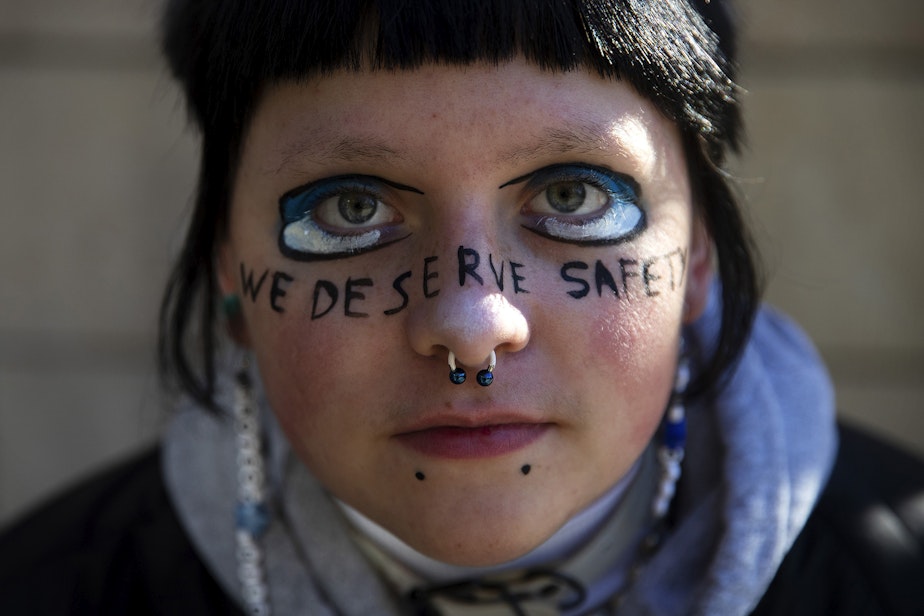Seattle City Council votes against restoring student mental health funds back to $20 million again

The Seattle City Council for a second time voted against restoring $20 million in funding for student mental health services on Tuesday, after it was cut by half earlier this year.
Instead, they voted unanimously to add an additional $2.5 million back to the pot, an amount Councilmember Dan Strauss reasoned would be more feasible to implement by the end of 2024. This brings the total amount to $12.5 million.
The previous city council had approved $20 million last November, paid for by a payroll tax on large businesses. But student activists were told earlier this year that the city didn’t have time to get the full amount out the door.
Only $10 million of that promised funding was authorized for school-based counselors, telehealth therapy, and youth violence prevention under Mayor Bruce Harrell’s mid-year supplemental budget package. A spokesperson for Harrell’s office said the city council didn’t include a clear plan for how to spend the $20 million.
RELATED: Seattle leaders fall short on promised $20 million for student mental health
Councilmember Tammy Morales, for the second time this month, proposed an amendment on Tuesday that would have restored the funds for student mental health back to $20 million and allow for money to go to several existing community-based organizations.
That amendment failed a second time, in a 5-4 vote.
Four council members voted against the same amendment during a select budget committee meeting last Wednesday. Councilmember Dan Strauss abstained.
“This may not be very specifically about mental health, but it is about providing safe spaces for young people to be able to access enrichment and services that can keep them out of trouble,” Morales said last week.
After the $20 million was approved last November, the mayor’s office asked the city’s Innovation and Performance Team to look into other investments being made in youth mental health, and to speak with students, parents, and mental health experts to understand the best approach.
“These tax dollars must be spent responsibly with coordination, equity, and accountability in mind as well as creating measurable outcomes for success,” said Callie Craighead, mayor’s office spokesperson.
Ingraham Senior Cici Kennedy told KUOW she was disappointed by the council’s decision on Tuesday.
“It hurt,” she said. “It just kind of felt like we were devaluing mental health support in general and not giving it the attention that it should be given in terms of money. It’s just not enough."
Kennedy understands firsthand what it's like to deal with the emotional aftermath of a shooting. She was in second period when she heard gunshots in November 2022.
Sitting in a nearby classroom, Kennedy, a sophomore at the time, thought the percussive explosions were the sounds of lockers slamming.
Instead, what she heard was a fellow student, 14, fatally shooting 17-year-old Ebenezer Haile in the hallway.
“Now every time that I hear somebody slam a locker, or if someone runs into one, or a book drops in the hallway, I immediately am thinking, ‘How can I get out of this room? How can I find safety?’” Kennedy said.
Sometimes, she said, she’d leave school mid-day on the brink of tears because of heightened stress and anxiety.
In an email sent to councilmember Maritza Rivera on Monday, five current and former Ingraham High School students, including Kennedy, asked her to vote in support of Morales’ amendment. Rivera voted against it.
During Rivera’s campaign, she was vocal about her two teenagers being inside Ingraham High School during the shooting in 2022 — an event Rivera said compelled her to run for council.
For six months, Kennedy said, she and other Ingraham students “wallowed” in their feelings and memories, deprived of meaningful counseling that administrators had promised them.
Kennedy said she was forced to seek therapy outside of school-provided resources. It took five months to find an available therapist that fit her needs.
“I am among those who are more fortunate, as I had the privilege and support from my family to obtain the help I needed,” Kennedy said in an email to Rivera. “Mental health support is a necessity. No one should have to fight alone.”
Unallocated money will be returned to the payroll expense tax balance and could be used for other purposes in the 2025-2026 budget. The mayor’s budget proposal for next year is expected to be announced in September.






